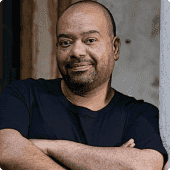
About us
The Marimba is supported by PROCULTURA, part of the PALOP–TL and EU program, financed by the European Union, co-financed and ran by Camões I.P., which works towards the promotion of employment and income generating activities on the cultural sector of the PALOP and East Timor.
The Marimba project has the goal of valuing music production in Angola, Guinea-Bissau, Mozambique and East Timor, with undirect influence on the remaining Portuguese-speaking African Countries and East Timor (PALOP-TL). The naming of the project was inspired in the marimba, a worldwide spread musical instrument that originated from african xylophones (up until today can be found in Angola, Mozambique and Guinea-Bissau) that come from the 1st century Gamelans in Indonesia, which the rythms also influenced the East Timor music.
The project acknowledges that innovation and artistic creation are based on intangible heritage, and that its knowledge and dissemination are an essential contribution to the countries' artistic, cultural and socio-economic development. Focusing primarily on the music area, the project has the intention of promoting, in different levels, the knowledge and the valuing the musical heritage of the participant countries: its research (based in any pre-existing collections - namely the ones produced between 1945 and 1986), either in field recordings, digitalization, promotion and international distribution. On the other hand, it intends to encourage the artistic creation of young artists from the participant countries, as a way to play a role in the rescuing of their cultural identities, in dignifying their artistic status, releasing their work and promoting their careers on a international scale, encouraging namely young women from the participant countries to becoming professional in the creative sector. Due to its uniqueness, values and comprehensiveness, Marimba is an innovating and transforming project in the context of the PALOP-TL.
It challenges public and private entities to develop a wide and solid collaboration as way of rediscovering their musical heritage, its research, its knowledge, its international dissemination and commercialization, as well as providing a powerful incentive to young contemporary artists and their creation, and to developing creative businesses. This incentive comes from the existing contrast between the extreme quality and diversity of the musical heritage and creation on the participant countries and their lack of expression and recognition in the international markets, which prevents the young creator from pursuing a career in the cultural and creative sectors, resulting in a high unemployment rate, particularly in young women. The situation became an emergency after the Covid-19 pandemic that has led to a general paralysis of the sector and a drastic increase in social emergencies in the context of cultural and creative activity. In order to demonstrate the potential of this approach, interventions in two different territory profiles were considered: On the one hand, Angola and Mozambique, where there is a relevant musical heritage recorded, particularly in radio archives (although at accelerated risk of loss); and Guinea-Bissau and East Timor, where the work is carried out to upstream the music value chain, opting for a priority focus on fieldwork to collect musical expressions. In any case, the cultural and creative sectors have common characteristics: low business sustainability, low levels of technical training, high levels of professional precariousness, and institutional disarticulation.
Essentially, the Marimba project's mission is to contribute to the sustainability and internationalization of the PALOP-TL music sector and to the social inclusion and professional integration of young artists, with special emphasis on strengthening the role of women in the social, cultural and economic life of the PALOP-TL.
The management model foreseen for the project is supported by three fundamental pillars: the constitution of an international consortium formed in a collaborative network model, with an effective presence in each of the participating countries; the creation of a digital platform for collaboration, registration, sharing, dissemination, and commercialization; the creation of a transnational publishing company among the PALOP-TL countries that promotes and distributes the phonographic editions generated within the project as well as its authors and performers.
The activities developed were designed to produce structural, sustainable and transformative results in the current scenario of Cultural and Creative Industries (CCI), highlighting the solidity and profile of the partnerships created that, while maintaining a clear entrepreneurial vocation (involving agents that operate nationally and internationally), also involve agents of the third sector, which will ensure social, gender, economic and territorial cohesion which the project also proposes. The project acts in an integrated way in all links of the music industry value chain, from training to internationalization.
In summary terms, the main activities implemented under the Marimba project are as follows: - Marimba Academy - Training and technical qualification program; - Marimba Digital Platform : - MARIMBA GUIDE - PALOP-TL musicians' guide (to be integrated in the digital platform); - Marimba Heritage - Research, study and classification of the musical heritage program; - Marimba Challenges - Young Creators Contests; - Marimba Sounds - Creation of a new record company, based in Mozambique; - Marimba Startups - program to stimulate the creation of new creative businesses among women; - Marimba Booking - Booking and international distribution of music from PALOP-TL; - Marimba Gathering - professional meeting and marketing event; - Project promotion; - Project monitoring and evaluation; - Creation of the Marimba Association to ensure post-project sustainability.
platforms
Platforms
ambassadors
Ambassadors
The project also has the active support of a group of internationally recognized “ambassador” artists who represent the musical expressions of the various participating partner countries. Their main function will be to encourage and motivate the participation of young artists as unifying and motivating elements, also assuming themselves as faces of the Marimba project with the media and the general public.

Stewart Sukuma
Mozambique

Paulo Flores
Angola

Nástio Mosquito
Angola

Denilson Junior
East Timor

Nara Couto
Brasil

Patche di Rima
Guinea Bissau

Manecas Costa
Guinea Bissau




